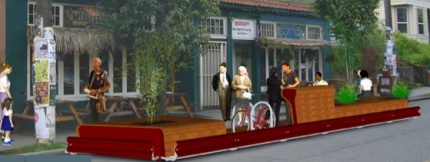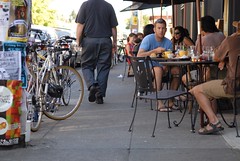
(Illustration by Joshua Cohen/Fat Pencil Studio)
When San Francisco debuted their “sidewalk extensions” back in February, they made quite an impression here in Portland. Local environmental scientist Rebecca Hamilton was so inspired by the idea she threw herself head-first into bringing one to Portland.
Hamilton is behind Re-thinking the Right of Way (RetROW), a grassroots group hoping to install “ped plazas” in Portland. The mini plazas would transform 1-2 on-street parking spaces into benches, planters, and maybe even a bit of bike parking. Hamilton sees the plazas as a way to make streets more human-scale:
“We’ve got some avenues that are very pedestrian intensive… but you can see there’s a greater need for people in those spaces than there is for on-street parking. It might be time to think of re-purposing that space for people instead of private storage space. It’s also a great way to build community and strengthen the neighborhood.”

(Photo: RebarGroup.org)
After New York City unveiled their version of the “sidewalk extension” (which they dubbed a “pop-up cafe”) last week, I checked in on how Hamilton’s efforts are coming along.
Hamilton and her partner on the project, designer and illustrator Joshua Cohen of Fat Pencil Studio, met with PBOT back in March and have nothing but praise for how supportive the City has been. PBOT staff have suggested possible locations, advised them on engineering and liability issues, and connected them with potentially supportive businesses. In May, RetROW applied for a Community Livability Grant through the Portland Development Commission and PBOT wrote a letter of support for their application. The letter, signed by PBOT Director Sue Keil, stated:
“This project offers an innovative and low cost approach to improve the pedestrian environment and enhance community vibrancy in Portland’s neighborhood commercial centers.”
Unfortunately they didn’t get the grant, but that hasn’t stopped Hamilton from trying to move the idea forward.
“We want to put some cool things out there to get people tugging at PBOT’s pant legs and saying ‘Hey, we want these!'”
— Rebecca Hamilton, RetROW
While Hamilton maintains, “We have a good relationship with the city” she also acknowledges that there are some “major issues to work out before they’re willing to put something on the streets.” Liability is a big one. The City has to be sure who’s responsible for the structure (them or the adjacent business owner). There’s also the permitting process, which includes a design and engineering review; support from local neighborhoods and businesses; a maintenance agreement; and a repair budget and contingency plan in case the structure is damaged.
New York City’s pop-up cafe reportedly took just 35 days from idea to installation. Hamilton says she’s also learned that New York City flew out a designer from San Francisco’s Pavement to Parks program to kick-start their project. That’s a sign, Hamilton says, “That means those cities are actively trying to incorporate this sort of space into their environment.”

of sense on Alberta Street, where
crowded sidewalks are common.
(Photo © J. Maus)
I asked Hamilton why she thinks PBOT, who has known and supported the idea since March, hasn’t made it happen yet. She says it feels “Like something that we’re trying to push from the ground up. It doesn’t seem yet that there’s a big enough demand from the people for them [PBOT] to start working top down and investing their time and resources on this project.”
Hamilton said New York City and San Francisco both already have city-sponsored programs specifically to re-purpose street space to create more public plazas; the New York City Public Plaza Program and Pavement to Parks respectively. Both cities also have planning documents in place that support the plazas.
“Without a government mandate,” Hamilton says, “and with no dedicated financial or personnel resources within the City to pursue this, much of the leg work and funding for Ped Plazas is up to the people that want them.”
Hamilton’s hope is to get one of the ped plazas installed as a pilot. Right now, she thinks it would be easier to buy an existing structure from San Francisco-based Rebar Group, who has already made and tested the design. The price to get it to Portland is $15,000 (once the first one is installed, then they’d create a Portland-made version).
RetROW is now focusing their efforts on doing more community outreach. Their big target is Park(ing) Day which is September 17th. Hamilton says they’re also looking for business owners who might be interested in hosting a “one-day parklet” in front of their shop. And of course they need more community support. “We want to put some cool things out there to get people tugging at PBOT’s pant legs and saying ‘Hey, we want these!'”
To learn more, visit RetROW.org or email Rebecca Hamilton at rebecca[dot]hamilton[at]retrow[dot]org.

